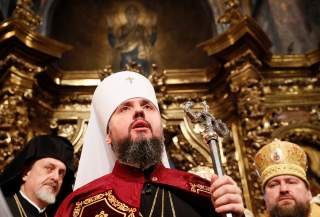Ukraine's Crisis of Religion
Volodymyr Zelensky is Ukraine’s best chance for reducing church tension, promoting inter-confessional dialogue.
Transferring parishes from the Moscow Patriarchate to the Orthodox Church of Ukraine is the most immediate problem. An ambiguous law passed in January 2018 permits the transfer of parishes from the Moscow Patriarchate to the new Kievan Patriarchate with a simple majority vote. The exact procedures are murky, as is any definition of what constitutes a legitimate majority. In response to allegations of state interference in parish transfers, the Moscow Patriarchate has reportedly dispatched teams of priests, accompanied by lawyers, to some of the parishes in question. Of about twelve thousand parishes under the jurisdiction of Moscow, about 320, or 2.5 percent, are reported to have changed allegiance since the creation of the OCU, though this figure is contested by the Moscow Patriarchate.
Another controversy centers around a law, ratified by the Ukrainian Rada but since suspended by the country’s supreme court, pending an appeal, that requires the canonical church (known officially as the Ukrainian Orthodox Church—Moscow Patriarchate) to rename itself to the Russian Orthodox Church of Ukraine. The intent of the law is quite clear: by forcing the church to re-register itself as the “Russian” Orthodox Church of Ukraine, the Ukrainian government hopes to draw parishioners, many of whom simply attend church without considering its jurisdiction, away from something “Russian” and towards something “Ukrainian.” Prime ministers in the Ukrainian Rada have vowed file an appeal to overturn suspension of the law. Irrespective of the outcome of the court case, it is unclear how the law would be enforced on the local level, which is where the competition for church influence will be most important.
Zelensky has inherited an unenviable situation domestically and internationally. It remains to be seen whether he will be able to overcome the calcified bureaucracy and endemic corruption that plagues Ukraine’s political system. But when it comes to the most divisive issues facing the country, his status as an outsider could become an advantage. Zelensky has embraced patriotic causes in his campaign, including his support for an independent Ukrainian Church. But he also campaigned on a civic-minded message of unity, making overtures to an eventual peace settlement in the Donbass and maintain good relations with each of Ukraine’s religious denominations. Exactly how successful the Volodymyr Zelensky presidency will be is anyone’s guess, but he is currently Ukraine’s best chance for reducing church tension, promoting inter-confessional dialogue, and limiting the spread of a religious dimension within an already bitter internal conflict.
Daniel Hanson is a recent graduate of Georgetown University's Eurasian, Russian, and East European Studies program. He is currently the Russia research intern at the Center for the National Interest. Image: Reuters

